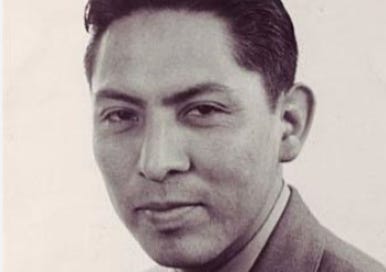It’s not often that a story hits you with the weight of legend and the edge of reality. But the story of Joseph Medicine Crow—how he became the last war chief of the Crow Nation while fighting Nazis in World War II—still gives me chills.
It’s the kind of tale that feels like it shouldn’t be real, like something from a dream of America before it was paved over. Yet every piece of it happened: the feathers, the coup, the horse, the song.
Warrior, Scholar, Soldier
Joseph Medicine Crow was born in 1913 on the Crow Reservation in Montana. He grew up listening to the oral histories of his tribe, absorbing the stories of warriors from the Little Bighorn to the plains campaigns of the 19th century. His grandfather had ridden with Custer’s scouts. Medicine Crow himself would grow up to be the first in his tribe to earn a master’s degree—studying anthropology, with a focus on the very warriors whose memory he carried.
He was already a historian when war broke out. But in 1943, he put down the pen and picked up the rifle. He joined the U.S. Army, serving as a scout in the 103rd Infantry Division in Europe.
Here’s where the story turns from remarkable to surreal.
Earning the War Chief Title
In Crow tradition, there are four requirements a man must fulfill to become a war chief—each a test of bravery, skill, and cunning. These aren’t metaphors. They are very specific:
Touch an enemy without killing him (known as "counting coup").
Take an enemy’s weapon.
Lead a successful war party.
Steal an enemy’s horse.
The assumption, of course, was that these feats were only possible in the time of bow and horse. The World Wars, with their mechanized slaughter and faceless tactics, seemed to make the old codes obsolete.
But Joseph Medicine Crow did all four. In Europe. Against the Nazis.
One day, during a firefight, he rounded a corner and ran directly into a young German soldier. They collided. Medicine Crow knocked the man’s weapon away and tackled him. In the chaos of the moment, he was strangling the German. The thing that gave him pause was when the German soldier was able to draw a breath, his only word was “Mama”. Crow kept the gun and let the kid go.
That counted coup.
In another engagement, he led a successful raiding party that attacked and captured a German position—satisfying the requirement to lead a war party.
Then there was the moment that seals the legend. Near the end of the war, he came across a German farmhouse with SS troops nearby. Tethered outside were dozens of horses, not a typical sight on 20th century Central European battlefield. Medicine Crow snuck through the chaos and stole fifty horses. As he rode off, he began singing a Crow war song his grandfather had taught him.
A Word About "Real Men"
Let’s pause for a moment and consider the current state of manhood discourse. Scroll through YouTube or TikTok and you’ll find a rising chorus of self-styled alpha gurus selling purpose like it's protein powder. "High-value men." Cold plunges. Hustle. Discipline. Sigma grindset. The algorithm never stops pushing men toward something that looks like ancient masculinity filtered through a stack of Joe Rogan clips and crypto ads.
And yet here was Joseph Medicine Crow—no podcast, no merch line, no self-mythologizing. Just an actual war party. An actual horse. A war song passed down generations, sung on stolen ground.
He didn't need to yell about being a warrior. He was one. Quietly. On foot. Doing the work that didn't need an audience.
That contrast sticks with me. In a world where masculinity is often confused with noise, Medicine Crow’s life was signal.
And to be clear—my view of masculinity is expansive. I don't think you need to steal a horse to be a man. I think care work, self-doubt, softness, kitchen-table courage—all of that belongs to manhood too. But what Joseph Medicine Crow did? That’s undeniably comic book badass. What makes it extraordinary, though, isn't just the checklist he completed. It’s how he carried it.
He did what needed to be done. Bravely. But with dignity. With imagination. With a sense of narrative. He wasn't just surviving a war—he was threading a thousand-year story into it. He didn't wear his actions like armor or trophy. He sang them into being.
That’s what chills me.
After the War
Joseph Medicine Crow didn’t brag. He told the stories with the calm, direct cadence of someone who never needed to prove anything.
After the war, he returned to his role as a tribal historian and public speaker. He served as a bridge—between the Crow past and American present, between oral tradition and academic record. He received the Presidential Medal of Freedom in 2009, but long before that, he was already known and honored in Native circles as the last traditional war chief.
He died in 2016 at the age of 102.
Why It Still Echoes
In a world drenched in irony and self-reference, Joseph Medicine Crow’s story feels like cold water to the face. Not just because it’s “inspiring” in the Pinterest quote sense. It’s more primal than that.
There’s something haunting about a man carrying a thousand years of memory into a mechanized war, and not just surviving it—but outwitting it. There’s something alive in the way he treated courage—not as abstraction, but as action. Specific action. And that specificity—ride the horse, sing the song, spare the enemy, take the weapon—reminds us that legacy isn’t carved in stone. It’s made on foot. On horseback. In the moment when the trigger isn’t pulled.
We don’t get many stories like this. Stories that fuse the mythic and the modern so cleanly, without collapsing into sentimentality. There’s no melodrama in Joseph Medicine Crow’s voice. Just clarity. As if he knew the echo he was riding with.
And maybe he did.




